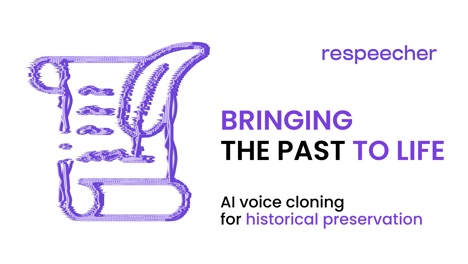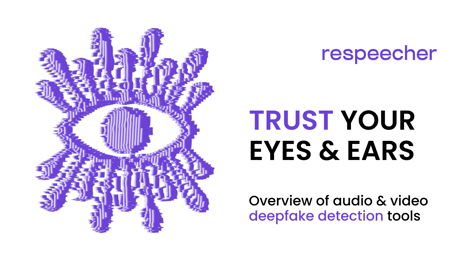From Principles to Practice: Respeecher Applies PAI Guidelines to Synthetic Media Creation

Since the beginning of its collaboration with the Partnership on AI (PAI) as a founding partner, Respeecher has been committed to embracing and integrating AI ethics into its practices. The Synthetic Media Framework developed by PAI and adopted by Respeecher serves as a comprehensive set of guidelines designed to promote the responsible development and deployment of synthetic media technologies, including AI voice cloning.
Integrating synthetic voices and media holds immense potential to revolutionize how we communicate, learn, and engage with content. However, with this transformative power comes many ethical considerations that demand careful attention and responsible implementation.
Voice AI, with its ability to synthesize human-like speech, and synthetic media, encompassing a range of AI-generated content such as deepfakes and AI-generated imagery, have captivated and concerned observers. While these technologies offer unprecedented opportunities for creativity, accessibility, and innovation, they also raise significant ethical dilemmas surrounding consent, privacy, and misinformation. As these technologies continue to evolve, it becomes increasingly crucial to establish guidelines that ensure their ethical and responsible use.
Recognizing the urgency of addressing these ethical concerns, the Partnership on AI (PAI) has proactively developed the Synthetic Media Framework. This framework serves as a comprehensive set of guidelines designed to promote the responsible development and deployment of synthetic media technologies.
Overview of Synthetic Media and Governance
Synthetic media has opened up new possibilities for creativity and storytelling. From digitally resurrecting deceased actors to crafting hyper-realistic CGI characters, filmmakers and content creators have leveraged synthetic media to push the boundaries of visual effects and immersive storytelling. Moreover, synthetic voices and avatars allow companies to personalize consumer interactions and enhance brand engagement in industries such as advertising and marketing.
However, synthetic media also poses significant risks and ethical challenges alongside its innovative potential. One primary concern revolves around the potential for misinformation and deception. Deepfake technology, in particular, has raised alarms about its potential to manipulate public discourse and undermine trust in visual evidence. From political propaganda to doctored videos targeting individuals, the spread of malicious deepfakes has the potential to sow confusion and erode societal trust.
In light of these ethical concerns, Partnership on AI (PAI) has established a framework to govern the responsible use of synthetic media. The PAI Framework emphasizes consent, disclosure, and differentiation between harmful and beneficial use cases. Consent, in the context of synthetic media, pertains to obtaining explicit permission from individuals before using their likeness or voice in synthetic content. Disclosure involves transparently labeling synthetic media to distinguish it from authentic content, ensuring viewers know its artificial nature. Additionally, the framework underscores the importance of discerning between AI generated contet that serve legitimate purposes, such as entertainment or education, and those intended to deceive or harm.
By adhering to the principles outlined in the PAI Framework, stakeholders in the synthetic media ecosystem can mitigate the risks associated with its misuse while harnessing its potential for positive innovation. The framework aims to promote accountability, transparency, and trust within the generative AI landscape through clear guidelines on ethical AI practices. As synthetic media continues to increase and evolve, the PAI Framework is a critical cornerstone for governing its ethical and responsible use across diverse sectors and applications.
Case Studies from the PAI Framework
The Partnership on AI Framework presents case studies highlighting the evolving landscape of synthetic media governance, emphasizing transparency, safety, and digital dignity online. These case studies exemplify various aspects of AI policymaking and emergent best practices, focusing on consent, disclosure, and differentiation between harmful and creative use cases. Through collaborative efforts and voluntary commitments, institutions involved in synthetic media production and distribution share common values while adapting to the fast-paced nature of the field. The cases shed light on institutional practices and contribute to refining policies and practices for responsible synthetic media use, ultimately informing future policy efforts and multistakeholder work on its governance.
Respeecher and PAI Framework Integration
Respeecher, a voice cloning company, integrates the PAI Framework into its voice cloning technology to ensure consent and transparency. As a pioneer in the field, Respeecher operates both in the B2B and B2C sectors, offering tailored AI voice cloning services to businesses and a Voice Marketplace platform for individual consumers and creators. In response to the ethical challenges associated with voice cloning technology, Respeecher adopted comprehensive labeling and metadata strategies, ensuring transparency and consent in its B2B and B2C platforms. This strategic enhancement aligns with the principles outlined in the PAI Framework, emphasizing the importance of disclosure and transparency in maintaining the integrity of synthetic media.
In the B2B sector, Respeecher provides voice cloning services to businesses, especially in the media and entertainment sectors: film and TV, animation, gaming, advertising, podcasts and audiobooks, and more. These services are customized to meet the unique needs of each organization, with a focus on obtaining proper consent from original voice owners, voice actors and preventing potential misuse of the technology. Ethical considerations are paramount in this context, as Respeecher aims to balance ethical obligations with the creative freedom of its clients.
In the B2C sector, Respeecher operates the Voice Marketplace, offering pre-made synthetic voices to individual consumers and independent creators. In this domain, transparency in voice usage and safeguarding against fraudulent or harmful applications are central to Respeecher's approach. By implementing clear labeling and providing detailed metadata about the origin and creation of AI voices, Respeecher aims to educate users on AI ethics and mitigate potential misuse.
Challenges in Ethical Implementation
Respeecher, a prominent player in the synthetic media landscape, faces a multifaceted challenge in navigating the delicate balance between disclosure requirements and creative integrity in media production. As a provider of synthetic voice technology and generative AI, Respeecher operates at the intersection of artistry and AI ethics, where the demand for transparency collides with the imperative of preserving artistic expression.
At the heart of this challenge lies the tension between transparently labeling synthetic voices and upholding content creators' creative vision. In industries such as entertainment and art, where storytelling and aesthetic innovation are paramount, imposing disclosure requirements can potentially stifle creative freedom and compromise audiences' immersive experiences. Content creators often seek to seamlessly integrate AI voices into their productions, blurring the distinction between human and synthetic elements to evoke emotion and captivate viewers.
However, this pursuit of artistic authenticity must be balanced with the ethical imperative of transparency. In accordance with the PAI Framework, Respeecher recognizes the importance of disclosing the use of synthetic voices to consumers, ensuring that they are aware of the content's artificial nature. Yet, achieving this transparency without detracting from the work's artistic integrity poses a significant challenge.
Respeecher's approach to addressing this challenge involves a nuanced understanding of context and audience expectations. By collaborating closely with content creators and providing them with tools for transparently labeling AI voices, Respeecher enables them to maintain creative control while fulfilling ethical obligations. This collaborative process empowers content creators to make informed decisions about how and when to disclose the use of synthetic voices, striking a delicate balance between artistic expression and ethical transparency.
Moreover, Respeecher's adherence to the PAI Framework extends beyond mere compliance to proactive engagement in setting industry standards and promoting best practices. Respeecher has emerged as a trailblazer in promoting ethical practices within the synthetic media industry by prioritizing principles of consent and transparency in their gen AI solutions. Through initiatives such as educational outreach and advocacy for responsible use, Respeecher plays a pivotal role in building trust and credibility in voice cloning technology.
Real-world Impact by Respeecher
Respeecher, a pioneering AI voice cloning company, has made significant strides in breathing life into iconic voices of the past and facilitating tributes to renowned figures. In the documentary "Goliath" by Paramount+ and Showtime, Respeecher resurrected the voice of basketball legend Wilt Chamberlain, showcasing the potential of AI in reviving historical figures. Similarly, Respeecher embarked on the ambitious endeavor of resurrecting the voice of Hawkwind's Robert Calvert, demonstrating its ability to bridge the gap between bygone eras and contemporary technology.
Moreover, Respeecher played a pivotal role in creating a digital representation of Vince Lombardi for Super Bowl LV, showcasing its versatility in various domains beyond entertainment. Additionally, Respeecher collaborated with musician Aloe Blacc to pay homage to Avicii by enabling multilingual performances of the hit song "Wake Me Up" in English, Mandarin, Spanish, Italian, and French. This collaboration underscores Respeecher's capacity to transcend language barriers and facilitate artistic expression on a global scale, ensuring the enduring legacy of renowned artists like Avicii reaches audiences worldwide.
Conclusion
The importance of ethical guidelines for synthetic media in governing the responsible use of voice cloning technology cannot be overstated. These guidelines serve as essential guardrails, guiding industry stakeholders in navigating the ethical complexities of developing and deploying synthetic voices. Ethical frameworks like the one established by the Partnership on AI (PAI) are vital in mitigating risks and fostering trust within the synthetic media ecosystem by upholding transparency, consent, and accountability principles. Respeecher's dedication to ethical practices is a testament to responsible innovation's transformative impact. Respeecher recognizes that the journey toward ethical excellence is a collaborative endeavor. Moreover, the guidelines are accepted by many renowned companies, including Adobe, BBC, CBS News, Open AI, and others. Encouraging dialogue and collaboration among industry stakeholders is essential for navigating the ethical complexities of voice AI and synthetic media.
FAQ
The Partnership on AI (PAI) Synthetic Media Framework provides ethical guidelines for the development and use of synthetic media, including AI voice technology. It promotes responsible AI practices by emphasizing transparency, consent, and distinguishing between harmful and beneficial uses of synthetic media.
Respeecher follows the PAI framework by ensuring transparency and obtaining explicit consent from voice owners. It uses clear labeling and metadata to disclose the synthetic nature of voices in both B2B and B2C platforms, mitigating misuse and adhering to ethical guidelines for voice cloning.
Synthetic media, including voice cloning and deepfakes, carries risks like misinformation, privacy violations, and deceptive content. These technologies can manipulate public opinion and undermine trust in media. Ensuring transparency, consent, and ethical usage is crucial to mitigate these risks.
The PAI Framework combats misinformation by advocating for disclosure and consent in synthetic media. It encourages clear labeling of AI-generated content to distinguish it from authentic material, ensuring transparency and reducing the risk of malicious use, such as deepfakes and misleading narratives.
Yes, Respeecher ensures responsible use of voice cloning in entertainment by following ethical guidelines. It emphasizes transparency, consent, and creative control, allowing content creators to use AI voices while maintaining ethical standards and respecting both artistic integrity and audience trust.
Glossary
Synthetic media
Voice cloning
AI ethics
Misinformation risks
Transparency and consent






